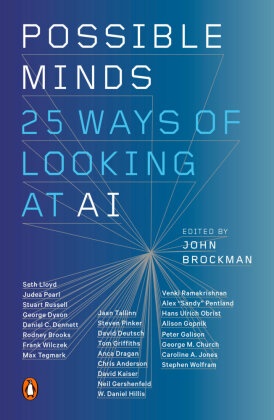Possible Minds - Twenty-Five Ways of Looking at AI
| Verlag | Penguin US |
| Auflage | 2020 |
| Seiten | 320 |
| Format | 13,9 x 21,4 x 1,9 cm |
| Gewicht | 306 g |
| Artikeltyp | Englisches Buch |
| ISBN-10 | 0525558012 |
| EAN | 9780525558019 |
| Bestell-Nr | 52555801EA |
Science world luminary John Brockman assembles twenty-five of the most important scientific minds, people who have been thinking about the field artificial intelligence for most of their careers, for an unparalleled round-table examination about mind, thinking, intelligence and what it means to be human.
"Artificial intelligence is today's story--the story behind all other stories. It is the Second Coming and the Apocalypse at the same time: Good AI versus evil AI." --John Brockman
More than sixty years ago, mathematician-philosopher Norbert Wiener published a book on the place of machines in society that ended with a warning: "we shall never receive the right answers to our questions unless we ask the right questions.... The hour is very late, and the choice of good and evil knocks at our door."
In the wake of advances in unsupervised, self-improving machine learning, a small but influential community of thinkers is considering Wiener's words again. In Poss ible Minds, John Brockman gathers their disparate visions of where AI might be taking us.
The fruit of the long history of Brockman's profound engagement with the most important scientific minds who have been thinking about AI--from Alison Gopnik and David Deutsch to Frank Wilczek and Stephen Wolfram--Possible Minds is an ideal introduction to the landscape of crucial issues AI presents. The collision between opposing perspectives is salutary and exhilarating; some of these figures, such as computer scientist Stuart Russell, Skype co-founder Jaan Tallinn, and physicist Max Tegmark, are deeply concerned with the threat of AI, including the existential one, while others, notably robotics entrepreneur Rodney Brooks, philosopher Daniel Dennett, and bestselling author Steven Pinker, have a very different view. Serious, searching and authoritative, Possible Minds lays out the intellectual landscape of one of the most important topics of our time.
Rezension:
A fascinating map of AI s likely future and an overview of the difficult choices that will shape it. . . . A sense of respect for the human mind and humility about its limitations runs through the essays in Possible Minds. Foreign Affairs
Pithy essays on artificial intelligence. . . . Readers . . . will not find a better introduction than this book. Kirkus
While the [Possible Minds] authors disagree on the answers, they agree on the major question: what dangers might AI present to humankind? Within that framework, the essays offer a host of novel ideas. . . . Enlightening, entertaining, and exciting reading. Publishers Weekly

